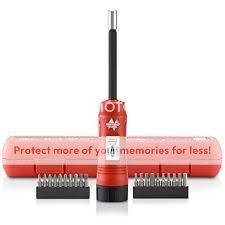I used a MTB one. They use them for doing up stem bolts. can be quite cheap, got my one from Germany i think
I've snapped far too many bolts working on the car so always use one
The idea that an item ceases to be out of spec in a finite or infinite fraction of time and it could have an infinitely variable quality after it's tested and is less useful than something that never has, is a little bit ludicrous. There's no issue with having a critical mind that questions everything, but then you need to question everything consistently. Logically if you can't trust one thing then there's no point in having that thing, and if you can't trust one thing, why trust another... perhaps it's better to train yourself to count the shots you take and how long your dive bottle is open so you know what the fill pressure is... then again you could get a gauge and say it's not random luck that it's still accurate on Tuesdays. In fact did you buy one that was calibrated to start with? Bet not.
It's not used in an intense production environment on critical items. My digital gauges can be certified, same as the wrench, that and the price are the differences between the ones that are calibrated, which just reflects the testing cost. I figure that if a company is selling both and they're the same thing, it's unlikely I'll need the other version. I could elect to reduce the issue by buying a fixed torque driver, but I prefer the flexibility of the variable one. I only do it on some gear, a lot of the time I use the finger technique because it's easier and works.
Torque settings depend on what materials and applications are involved. Using a driver really only ensures consistency. But they still need to be used correctly, there's less point in their use if you're going to do one side of the mount first and then do the other...
Last edited by RobF; 08-02-2019 at 09:08 AM.
Tongue in cheek (but in part, serious) - what do you use to calibrate your “finger effort” during the learning phase and how often do you recalibrate your “finger effort” with a calibrated test gauge?
Seriously, when I got a torque screwdriver (because of buying a more expensive scope) I was amazed at how little force was needed. Even though (until I got the torque screwdriver) I’d just “tiggled” the Allen key, it was still quite a bit more torque than should have been.
I use a Neiko 1/4'' Torque driver and personally find It a useful piece of kit. I have never had a mount come loose since using the driver, where as before when I used to use an allen key to tighten the mount screw, I did have the occasional mount screw come loose. Whether or not a person needs a Torque driver Is debatable, but I for one would not be without mine,
John

I received the reply below from Hawke when I asked about torque setting for mounts.
Good afternoon Mr ********
Thank you for your email.
Our recommended torque settings for rings is as below:
- Ring cap screws are 16 inch pounds (1.8 Nm)
- Base screws are 30 inch pounds (3.4 Nm)
How would you rate my reply?
GreatOkayNot Good
Kind regards,
Kate Cranmer
Hawke UK
uk@hawkeoptics.com
Bob
That info is contained within the instructions that come in the box also.
To be fair, the 1.8 for the caps to me is a bit too tight. It does not crimp but it does slightly indent to paint finish enough to be able to both see and feel the marking.
As before and works for me;
1.0 Nm for the caps
1.5 Nm for bases with arrestor
2.0 Nm for bases without arrestor
In a battle of wits I refuse to engage with an unarmed person.
To one shot one kill, you need to seek the S. Kill only comes from Skill
I use the Wheeler Fat Wrench as I over tightened some cheap mounts and had to get the angle grinder on them, so never again.
For the ring mounts I do 15 lb and the base I do 30 lb on them. I think they are the figures that Hawke recommend and since doing that I have never had a problem since. If you are like me and heavy handed then I would highly recommend spending about £55 on one of these.
Ade 👍
Shooting Air Rifles is like being a pubic hair on a toilet seat.
Eventually someone comes a long and P's you off.
They usually have a PCP
Torque wrench not necessary, as has been said above, my version is to use the short end of the Allen key, but I use a small rag to prevent it from hurting the hand, tighten it hard, you can't over tighten an Allen screw using the short end. When set up and finished, remove one screw at a time, apply blue loctite and retighten. job done, right torque, won't move. Done it this way for years, so has the US army sniper who showed me.